Age Is Just A Number
by Meghan Murphy
Select and Masters amateur classes are rapidly growing in size and becoming increasingly more competitive. The division, which was created to provide a new avenue of competition for the industry’s more mature competitors, allows amateur exhibitors over the age of 50 to compete against their peers. The Equine Chronicle wanted to learn a little more about this elite group, the type of horses they tend to show, and the unique challenges they face. We spoke with some of the industry’s highly successful Select and Masters exhibitors including Christine Hocutt-Senteney, Linda Coakley, Debby Brehm, Debi East, and Vicki Kent.
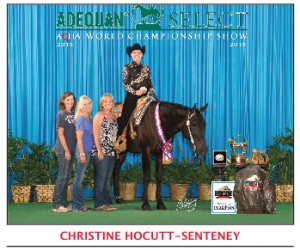 Christine Hocutt-Senteney of Burbank, California has been showing horses since she was nine years old. Currently, she competes in showmanship, horsemanship, western riding, and hunt seat equitation with her 16-year-old homebred gelding, Bellieve Hes Blazing. The duo has earned many accolades including impressive back-to-back Adequan Select World Championship wins in Western Horsemanship in 2012 and 2013.
Christine Hocutt-Senteney of Burbank, California has been showing horses since she was nine years old. Currently, she competes in showmanship, horsemanship, western riding, and hunt seat equitation with her 16-year-old homebred gelding, Bellieve Hes Blazing. The duo has earned many accolades including impressive back-to-back Adequan Select World Championship wins in Western Horsemanship in 2012 and 2013.
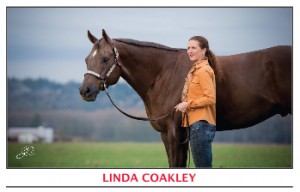
Linda Coakley of Clearlake, Washington has also been competing since the age of nine. She was recently named the 2013 Farnam Select All-Around Amateur with her 14-year-old gelding, Patsys Royal Secret. Coakley and her brown gelding compete in showmanship, horsemanship, hunt seat equitation, performance halter geldings, and plan on adding trail to their list of events for 2014.

Debby Brehm of Lincoln, Nebraska has been showing halter horses for more than 30 years and recently began competing in western pleasure. Brehm has won six World Championships and five Reserve World Championships with her halter horses. Her love for showing horses inspired her to learn more about riding and put her aboard red roan gelding, Sure Feels Good, and sorrel gelding, Vested Vitality.
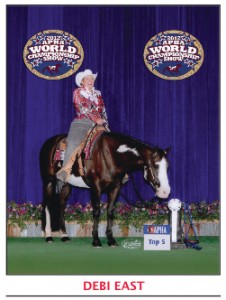 Debi East of Bountiful, Utah has been showing on the APHA circuit for more than 15 years. East has owned great horses that compete within a variety of disciplines including western pleasure, hunter under saddle, reining, working cow horse, and other all-around events. Currently, she shows her mare, Good Dividends, in western pleasure.
Debi East of Bountiful, Utah has been showing on the APHA circuit for more than 15 years. East has owned great horses that compete within a variety of disciplines including western pleasure, hunter under saddle, reining, working cow horse, and other all-around events. Currently, she shows her mare, Good Dividends, in western pleasure.
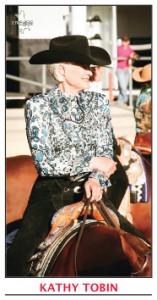 Kathy Tobin of Scottsdale, Arizona has been showing horses for 55 years. She has competed in everything from barrel racing to working cow horse, but today she only competes in trail, western riding, horsemanship, and occasionally hunter under saddle. Tobin has won five AQHA Adequan Select World Championships, most recently in western riding in 2013. Her current show string includes ten-year-old bay gelding, More Radical, eight-year-old sorrel gelding, RA Undisputed, and seven-year old sorrel gelding, The Best Cookie.
Kathy Tobin of Scottsdale, Arizona has been showing horses for 55 years. She has competed in everything from barrel racing to working cow horse, but today she only competes in trail, western riding, horsemanship, and occasionally hunter under saddle. Tobin has won five AQHA Adequan Select World Championships, most recently in western riding in 2013. Her current show string includes ten-year-old bay gelding, More Radical, eight-year-old sorrel gelding, RA Undisputed, and seven-year old sorrel gelding, The Best Cookie.
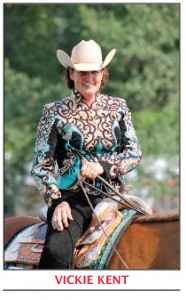 Vickie Kent of Graceville, Florida has been showing horses for over 25 years. She and her husband, Ronnie, are an inspiration to many in the industry. They have earned multiple World Championships with a string of homebred horses and are admired for their sportsmanship both inside and outside of the show arena. The Kents enjoy developing prospects into seasoned champions and cherish the relationships they build with each of their horses. Their current show string includes nine-year-old gelding, RV Won Good Version, five-year-old gelding, Won Lopin RV Machine, four-year-old mare, Miss RV Radical Sox, and four-year-old mare, RV Gifted Machine.
Vickie Kent of Graceville, Florida has been showing horses for over 25 years. She and her husband, Ronnie, are an inspiration to many in the industry. They have earned multiple World Championships with a string of homebred horses and are admired for their sportsmanship both inside and outside of the show arena. The Kents enjoy developing prospects into seasoned champions and cherish the relationships they build with each of their horses. Their current show string includes nine-year-old gelding, RV Won Good Version, five-year-old gelding, Won Lopin RV Machine, four-year-old mare, Miss RV Radical Sox, and four-year-old mare, RV Gifted Machine.
What’s so advantageous about competing in the Select Amateur division?
There are several reasons why the Select, in AQHA, or Masters, in APHA, divisions are so popular within the industry. In addition to hosting a World Championship Show especially for exhibitors aged 50 and older, most Select competitors appreciate the opportunity to compete against equestrians of their own age. Some Select exhibitors feel that showing against competitors close in age enables everyone to be on a more even playing field in terms of physical and mental maturity. Senteney says that for her, “the main advantage is competing against people who look like me. I show in classes that are judged on the rider, and it’s hard to compete with a young 25-year-old when you are 55. You just don’t look the same! It’s just a fact of life that you aren’t going to look like and be as physically fit as the younger amateurs.” Kent adds that, “a 20-year-old is always going to jog better and sit up easier. Their reflexes are quicker. The older you get, the harder it is to stay in shape. Arthritis makes it harder to compete in showmanship.” In addition to the natural aging process, Tobin adds that childbearing also puts the mature generation at a disadvantage when competing against younger amateurs. “All of us have had children, so our bodies aren’t competitive with the amateurs,” she says.
However, a leveled playing field in terms of physical fitness isn’t the only advantage. According to Kent, the division gives exhibitors a greater sense of understanding with each other because, “we have the same obstacles to deal with—parents that need care or who are in failing health.” Competing with people who are in the same stage of life is a big reason why Tobin loves the Select Amateur classes. Tobin says, “It makes it nicer to show with people with similar life experiences and knowledge of our generation. I didn’t win my first World Championship until I had shown for 45 years! I won a Reserve World Championship in 1994, but it took tons of miles, lots of sweat, and even tears to get to my first World Champion.”
One thing that makes the select amateur group so special is their general outlook on competition and the joy they find within the sport. Kent says, “we love to be with other people our age that love horses.” The Select group really sets an example for the younger generation in terms of what it means to be a good competitor. Coakley says, “the AQHA Select division is as tough a competition as can be. We are all out there trying to do our best and have many years of experience to help! I have come to love everyone I show with, because that’s how I think about it. I’m not really showing against them but with them. We all wish the others well and want to see everyone compete at their best. If they win, I congratulate them, and they do the same for me. I would not trade [our group] for anything!” Brehm, a former youth advisor in Nebraska, says she has always encouraged youth to be competitors in the pen and friends outside of the pen.
Likewise, East is a competitor who truly understands the ups and downs of a subjective sport. “I have learned, over the last few years, to just try and ride the class for [my horse] Dallas and myself,” she says. “I’m lucky that Mike [Hatchel] cares enough to have Dallas at her best, and this is always calming for me. If I feel we have had a great ride, then I feel like Dallas and I have won the World. I’m on cloud nine.” Being the best one can be while still maintaining composure when things don’t go as planned are great examples to set for the younger generation. Kent says, “I always try to remember that there will be another show next week or tomorrow if I mess up today. Maybe I can be better next time. I always want to be better.” She adds that it’s important to have fun and remember that everyone goes off pattern. “No matter how much you have won or how big or small the show is, it happens.”
Do select exhibitors have to ride seasoned horses to be competitive?
The answer is no. Opinions vary about what age of horse a select exhibitor should ride. Many people might believe that select competitors primarily show older, more seasoned horses. However, this belief is a common misconception. Nowadays, select competitors are showing a mix of seasoned horses and green horses. Many select exhibitors enjoy a steady, seasoned horse while others enjoy developing a prospect into a champion. Ultimately, unique challenges arise whether or not the horse is green or more experienced. Senteney prefers showing an experienced horse. “At my age, I love a seasoned horse,” she says. “Give me a kid-broke horse any day. I’m too old to take a chance!” While there haven’t been many challenges lately, while showing her older, kid-broke gelding, there were certainly challenges when he was young. The gelding wasn’t started until he was three years old due to a “freak stall accident that resulted in a severe injury to his mouth.” Once he was broke out and introduced to the show pen, it was a challenge for him to learn all of the events. Still, he kept getting better and more consistent each year. Now, Senteney keeps the 16-year-old gelding fresh by not over-schooling him and giving him lots of playtime. “Nancy’s [Renfro] two little girls ride him at the ranch, so he gets lots of treats and hugs and the love of children!”
Sometimes, the challenges that arise with senior horses relate to their health. Maintenance is critical for any athlete and even more so for older competitors. Coakley says keeping an older horse moving is a big key in their maintenance. In addition to daily exercise, she utilizes supplements, massage, chiropractic work, a great farrier, and a skilled veterinarian for her senior horse. Senior horses often require special diets and supplements to ensure they are receiving the necessary amount of nutrients for optimal performance. Coakley prefers “a seasoned show horse because they know their job.” However, the advantage of showing a more seasoned horse can also be a disadvantage at times, says East. “Showing a senior horse has challenges,” she says. “They [can be] ‘show smart’ and that makes them harder to show.” Brehm has two junior horses. She admits that although being a green rider with a green horse can be difficult at times, not always having a steady show horse to rely on has made her journey an even better learning experience. “I think it’s helping me to become a better rider since I must learn how to be the pilot on a horse versus just being propped up on a seasoned horse and letting him take me around the pen,” she says. “In the long run, this will be an advantage because I’m learning how to anticipate problems as well as correct them.”
There are many other select exhibitors who also appreciate the challenges that come along with showing a green horse. Building a relationship with a horse as it matures is something that Ronnie and Vickie Kent thoroughly enjoy. The couple is well known for achieving success with many different horses, all of which have been homebred. They enjoy both the challenges and the rewards of raising a teammate for the show pen. “Starting over with a new horse is not easy. We raise all the horses we show. We get very attached to them. However, when you raise them every year, you must sell some. Prospects that turn into seasoned horses make us proud.”
What do the top select exhibitors do to stay in show shape?
The answer involves having a regular workout routine and consistent time in the saddle. Brehm, who has a routine fitness plan, says, “I work out at a health club five days a week, but there is no exercise that can replace actual riding.” Consistent riding is what it seems to be all about. Kent, who says age makes it harder to stay in shape, rides daily. Coakley, who regularly exercises, also tries to ride at least several times a week. Tobin prefers to stay in shape by following a diet regimen and riding on a routine basis. For East, staying in shape is made up of flying to Texas several times a year to go to “boot camp.” Every select competitor has a fitness plan that’s designed for their own personal needs, but they all have two aspects in common: some type of physical activity and regular riding.
Be sure to check out www.equinechronicle.com to read a monthly blog by AQHA select competitor Candace Jussen. In “From a Select Point of View With Candace” she discusses everything from health challenges and methods of staying in shape to questions about politics and current horse show trends.
Click here to read the complete article!










